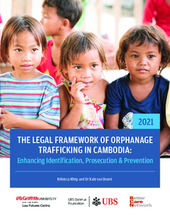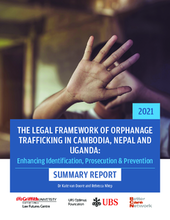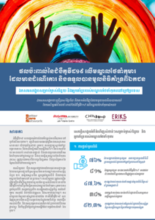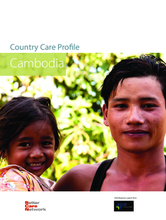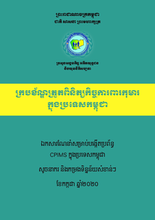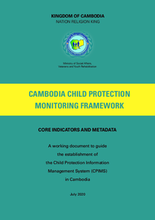This country page features an interactive, icon-based data dashboard providing a national-level overview of the status of children’s care and care reform efforts (a “Country Care Snapshot”), along with a list of resources and organizations in the country.
demographic_data
childrens_living_arrangement
children_living_without_bio
social_work_force
key_stakeholders
Key Stakeholders
Add New DataOther Relevant Reforms
Add New Datadrivers_of_institutionalisation
Drivers of Institutionaliziation
Add New Datakey_research_and_information
Key Data Sources
Add New DataMapping of residential care facilities in the capital and 24 provinces of the kingdom of Cambodia
National estimation of children in residential care institutions in Cambodia: A modelling study
Prevalence and number of children living in institutional care: global, regional, and country estimates
Shaping the national social protection strategy in Cambodia: Global influence and national ownership
Towards a Social Protection Strategy for the Poor and Vulnerable: Outcomes of the consultation process
Country Care Profile: Cambodia
Acknowledgements
Data for this country care snapshot was contributed by partners at Family Care First and UNICEF Cambodia.
Displaying 41 - 50 of 285
អង្គការ Save the Children រួមជាមួយអង្គការដៃគូចំនួន៧ កំពុងជួយលើកកម្ពស់សមត្ថភាពរបស់គ្រួសារទទួលផលក្នុងការថែទាំកូនៗរបស់ពួកគេ ដើម្បីសម្រេចឱ្យបាននូវសមទ្ធិផលនៃកិច្ចការពារកុមារប្រកបដោយភាពវិជ្ជមាន។ ដោយមានការគាំទ្រពីទីភ្នាក់ងារជំនួយសហរដ្ឋអាមេរិកដើម្បីការអភិវឌ្ឃអន្តរជាតិ (USAID) និងសហភាពអឺរ៉ុប គម្រោង FCF|REACT កំពុងផ្តល់នូវការឧបត្ថម្ភសាច់ប្រាក់ប្រចាំខែ និងផ្តល់ការគាំទ្រដល់អ្នកផ្តល់ការថែទាំក្នុងការចាត់អាទិភាពនូវការចំណាយរបស់ពួកគេដើម្បីឧត្តមប្រយោជន៍របស់កូនៗ។ មាននៅលើ
ស្របពេលដែលកើតមានឡើងនូវការឆ្លងរីករាលដាលនៃជំងឺកូវីដ-១៩ក្នុងសហគមន៍ ហើយសាលារៀន ត្រូវបានបិទទ្វារសារជាថ្មីនៅតាមបណ្តារាជធានីខេត្តផ្សេងៗនៅទូទាំងប្រទេសកម្ពុជា កុមារភាគច្រើនត្រូវនៅឃ្លាតឆ្ងាយពីមិត្តភក្តិម្តងទៀត និងមិនអាចរីករាយជាមួយសកម្មភាពដែលពួកគេធ្លាប់មាន។ នេះគឺជាវីដេអូខ្លីមួយដែលអប់រំអំពីគន្លឹះសំខាន់ៗចំនួនប្រាំ ដើម្បីលើកកម្ពស់សុខុមាលភាពផ្លូវចិត្តរបស់កុមារ នៅក្នុងពេលវេលាដ៏លំបាកមួយនេះ! សូមទស្សនា និងចែករំលែកបន្តទៅកាន់អ្នកដែលអ្នកគិតថា ពួកគេកំពុងត្រូវការចំណេះដឹងទាំងនេះ។ សូមរក្សាសុវត្ថិភាពរបស់ខ្លួនឱ្យបានខ្ជាប់ខ្ជួនគ្រប់ពេលវេលា!
Orphanage trafficking occurs at the nexus of criminal law (human trafficking offences) and child protection regulation. This report examines the intersection of these two legal systems for the purpose of developing a strategy to identify and prosecute orphanage trafficking.
This study assesses and maps the legal, policy and procedural frameworks in both domestic and international law across Nepal, Uganda and Cambodia, where orphanage trafficking continues to undermine domestic efforts to stem the overuse of institutionalisation of children.
This study was a small-scale piece of qualitative research that involved 21 semistructured interviews with founders, funders, and directors of RCIs across 7 countries. It was designed to better understand the impacts of COVID-19 on the operations of residential care institutions including funding, staffing, volunteering, children’s care, education, family connection and reintegration.
This country care profile provides an overview of key lessons learned in the children’s care reform process in Cambodia, including successes, challenges and areas for progress, and gaps in learning and best practice.
A recent inquiry has revealed that the former director of a high-profile Cambodian orphanage founded by a U.S. heiress, the Sovann Komar home, physically and sexually abused the children in his care and committed financial fraud, according to this article from the South China Morning Post.
"Child representatives and care leavers from South East Asia have called for increased support for continuing education, psychosocial care, finding jobs and affordable housing in the wake of COVID-19," according to this news article from SOS Children's Villages.
This document (written in Khmer), the Cambodia Child Protection Monitoring Framework, contains 50 core indicators considered important in assessing the child protection system in Cambodia.
This document, the Cambodia Child Protection Monitoring Framework, contains 50 core indicators considered important in assessing the child protection system in Cambodia.

